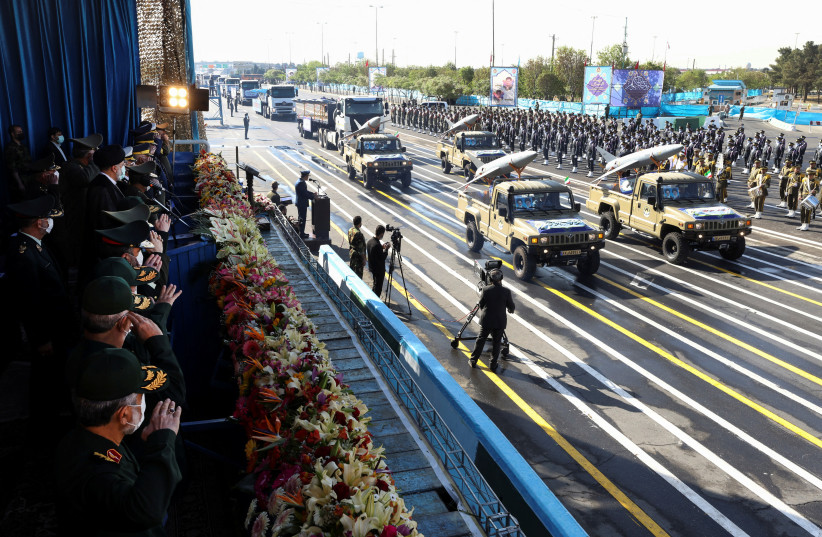Iranian media bragged overnight on Wednesday and Thursday that it had detained “diplomats” who were spying. The claims assert that they had used their diplomatic cover to collect samples and collect activity that led the Iranian IRGC Intelligence Organization to become suspicious and detain them.
“These spy diplomats were observed by IRGC drones while sampling the soil of the forbidden area in the central desert of Iran,” the Iranian media linked to the Guard Corps said. This may be a way for Iran’s IRGC intelligence organization to rehabilitate its image, a cover for missile advancement and a way to wring concessions for a new Iran deal.
The claims at both Fars and Tasnim assert that this is some success for Iran’s intelligence operations. “These videos also show how some people under the guise of tourists or researchers approach the country's military sites and try to take intelligence measures.”
Why are we hearing about this just now?
The report comes in the context of several important moving pieces in the region. First, it comes amid the JCPOA Iran deal talks, which recent ones in Doha and Europe are aimed at reviving. Iran seems to believe this to be a possibility, after appearing to walk away several times. Is this a good time to arrest European diplomats in order to pressure the Europeans?
Second, the reports come as there is focus on Iran’s missile and drone threats in the region. The US is concerned about drone threats. In addition, the return to aspects of the deal could hinge on Iran’s uranium enrichment progress and also its desire to create missiles that could possibly hold a nuclear payload.

Iran has good reason to keep secret what it is doing in the desert.
Third, let’s recall that Iran’s intelligence organization of the IRGC has suffered setbacks in recent months and has had staff changes. Jason Brodsky wrote at the Middle East Institute that “the departure of Hossein Taeb from his post as the head of Iran’s Islamic Revolutionary Guard Corps’ Intelligence Organization (IRGC-IO) triggered a wave of reshuffling in the command structure of the guardsmen.
"But the story is more than just a reaction to Iran’s unsuccessful terrorist targeting of Israelis in Turkey and counterintelligence lapses," he wrote. "There are internal power struggles and a natural maturation of the Islamic Republic’s security structure that also likely figured into the decision to remove Taeb.”
Let's break it down
Let’s unpack these three scenarios. First, Iran is trying to wring concessions from the West. Iranian agents decide to pick up some foreigners as part of the usual Iranian hostage taking. In addition, the arrests take place, supposedly, after the foreigners visit the Shahdad desert.
The Iranian reports, repeated by foreign media, note that the diplomats were detained by the IRGC “after it was determined they took the samples in a ‘forbidden area’ where missile exercises were carried out in the Shahdad desert in southeastern Kerman province,” noted Turkey's Anadolu news agency.
Diplomats being arrested would be big news. Among those supposedly detained was the British deputy ambassador, but the UK disputes this. Of course, language matters; reports of an “arrest” may be inaccurate. But Iran has made the assertion, which is designed to create some kind of storm.
Now let’s consider a second and third scenario here. Iran openly admits it is sensitive now because of “missile exercises.” Why admit this? Tehran is not exactly keeping it secret. So is Iran hiding some kind of missile advancement, but also showing off that it is detaining foreigners near the drills at the same time? Or, is the more likely scenario that Iran’s intelligence service wants to rehabilitate its image after months of failure? What better way to do that then to detain or claim to detain some Europeans?
The Tehran regime is a sophisticated one. It does not do things in a ham-handed manner, the way one might expect from Ankara’s current regime. The IRGC has its own logic and skills, and desire to appear to be defending the regime.
That the Guard Corps' image was tarnished in recent months is clear. That it wants to show it can detain some people, make up a big story to protect some “missile” tests, while also rocking the Iran deal boat, may be in its and the regime’s interest. It remains to be seen which scenario, or all three, are related to why Iran pounced on these foreigners.
